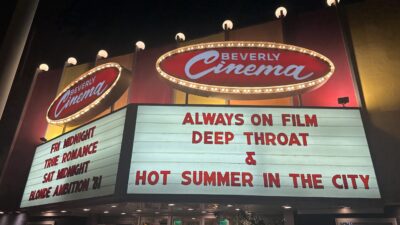This article previously appeared on Crossfader
I found out I grew up in a small town somewhere between my first and second year of college. The town was about 20 minutes from Boston and 10 minutes from the beach, there were “densely populated” signs when you drove through the old part of Ipswich, and even though I didn’t live in Ipswich, per se, my town was so small the whole North Shore felt like my town (still not enough to tip me off somehow), so Ipswich, and Beverly, and even Salem, counted? And those places couldn’t be small towns, right?
To me, a small town required everyone to know everyone, homecoming to be a big deal, and scandals to take place exclusively on brisk fall hay rides. Apparently, only having one Starbucks two towns over in an eight-mile ring of isolation, or the fact that Topsfield is exclusively known for its fair (and even then you lose recognition the second you hit south of The City), or even the fact that we called Boston “The City” was not enough to clue me into the fact that I grew up in the most quintessentially small-town of small towns—chickens in the yard and all—until I moved to “the City of Orange” in Southern California. Even then, it took at least a year.
But is this such a bad thing? Aren’t we all ultimately from some sort of small town? Granted, some small towns are slightly bigger than others, and sure, plenty of people are from actual cities. But isn’t “small-town” a mentality? Don’t we all at one point or another yearn for something bigger? It’s what you make of that lack of Starbucks, or those free-range suburban chickens. When asked, this is how Tucson-based band Cement Shoes defined what “small-town” meant to them: “a big family” and “a fun, close-knit scene.” For bassist Shane Cowen, it’s teaming with shared passion and camaraderie. “Also,” he adds, “it’s super hot here. Super sweaty.”
SAD JOKES, the recently released EP from the upbeat, punchy, “punk-rock-with-feelings” band is fueled by that sweat and small-town character. Oh, and free beer, can’t forget free beer. SAD JOKES bounces from one garage-y, distorted ode to navigating the precariousness of your 20s to another, never deflating the energy and passion they begin with. With anthemic, driving guitar riffs, tireless drums, and purling, emotive vocals, Cement Shoes pulls together an EP that soundtracks a night that began piled in the back of an old Westfalia, ripe with the smell of third-generation cigarettes, and ended watching the sunrise with steadily warming beers from the roof of a vacant parking structure. It’s “emo punk for people who drink at dive bars,” as drummer Taylor Carroll puts it. The energy and spirit of the music is reflected in their attitudes towards playing shows, Cowen describes as a tension between audience and band, “whatever happens in between the first note and the last is in real time, with no do-overs, and at the end of the night it’s set in stone.”
Taking punk into an image-centric era of social media and an unavoidably scrutinized public face, Cement Shoes remains honest, raw, and direct, qualities often misplaced in the age of the Instagram model. “At the end of the day, we aim to be as raw as we can be at least in our lyricism and sound. We don’t want to sound too polished and that comes from us all listening to a lot of DIY emo and indie,” notes Carroll. Mainly what we draw inspiration from is our own lives,” lead singer Matt Graham adds. “When we write, we tend to take the world we live in and just write it down as honestly as we can. Since the start of this band, we’ve always been critical of our own environment and perspectives, and we hope that translates into something our audience can relate to and find some comfort in. A decrease in privacy in the world dictated by social media has the benefit of connecting people with shared interests. In this case, clueing people in to bands they might not otherwise know, or on the other end, exposing bands that would otherwise be limited to a wider audience, and hasn’t hurt a band with nothing to hide: the raw honesty and transparency with which Cement Shoes carries itself is exactly what’s presented, nothing more, nothing less. “That’s the beauty of the punk scene,” says Graham. “It persists through a world that is consistently trying to destroy your attention span and direct what you’re supposed to think and how you consume those thoughts. The punk scene may be weak at times, but it’s not entirely concerned with the image-centric world because it truly exists in the real world.”
While the members of Cement Shoes could agree that the upside of living and performing in a city that often feels like an intimate town was that the community felt close-knit and supportive, the intimacy of a small town has its downsides. “I think that the biggest downside of a small town feel to the scene is actually how small it is,” says Carroll. “It seems like there’s only a handful of active bands within the scene. That can make it hard to put together shows or play to new people since every time we play it’s usually the same bands we play with and the same people that show up.” Guitarist Cody Cowen mentions that “the venues are really lacking. A lot of bands end up playing the same venues repeatedly or go out of town for shows.” But overall, Matt adds, “our city is where our lives take place, and the experiences we have here directly affect what we write about and how we naturally express that. As far as my relationship with the city, I would have to take some personal responsibility for getting into a little trouble here and there that inspires what I’m writing. I think that most people have to be influenced by their surroundings though.”
Small-town is a mentality, one that can be both good or bad. Typically, “small-town mentality” implies some varietal of narrow-mindedness, but I’d like to reclaim small towns. I would like to extract all the good things, squeeze out the community and camaraderie, and apply it to a city. Then you have a wonderful tight-knit community, one that supports and eggs its peers on without the “small-town”ness of it all. New York, for example: everyone is proud to be from there or to have survived this shared experience, but no one sticks around after their friend’s show to see the other acts—a music scene can’t feel close when the echoes of individuality bounce off empty walls. Carve out a small community, put down some ornamental rugs, and throw up tapestries: make a music scene feel intimate again. Take a leaf out of Cement Shoes’ songbook—reclaim small towns.
















Comments